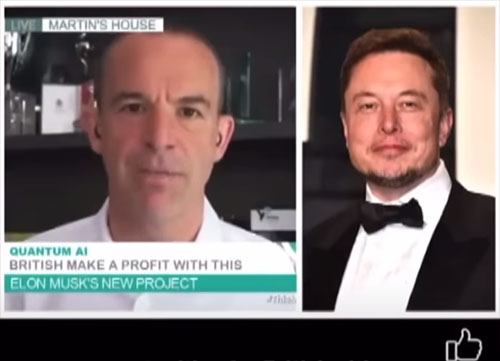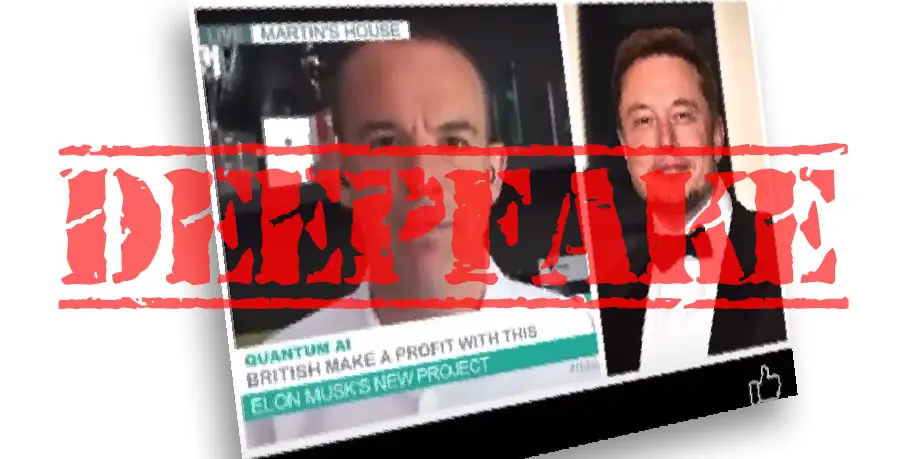Get-rich-quick scams now employing Deepfake videos
Get-rich-quick scammers are using “deepfake” AI technology to create fake celebrity endorsements, in order to make their scams appear more authentic in what is a significantly worrying development in the online scam industry.
Most people in the UK will know who Martin Lewis is. A reputable financial expert who can often be seen on TV offering money saving advice to the general public. And that’s why many may have been excited to see an interview of him where he adamantly promotes an investment opportunity associated with Elon Musk that, according to the interview “opens up great investment opportunities for British citizens“.
Only the interview isn’t real. It’s a deepfake, yet it is being used both on social media and on scam websites to trick victims into handing over their money to enrol in fake investment scams that falsely claim you can get rich using some automated investing or trading system.
‘Deepfake’ refers to the technology that is able to create videos and audio of people using artificial intelligence, in order to create fake videos featuring a person saying or doing things that never actually happened in the real world. In this case that video is an interview of Martin Lewis promoting some fake investment opportunity called Quantum AI. While the deepfake technology is still relatively new, it has become exponentially more convincing in the last handful of years.

And while up until now we’ve seen criminals or spammers flirt with deepfake technology, this represents the first time it has been used to such great effect.
The get-rich-quick scams themselves have been around for a number of years now. In fact Martin Lewis has previously sued Facebook because of them. Sadly Facebook and other platforms are still pretty hopeless at removing these scams, many of which actually pay the social media platforms themselves to appear in Sponsored Ads. We’ve previously discussed how they work multiple times. They generally work as follows –
1. Social media adverts claim celebrity has endorsed some exciting investment opportunity.
2. Links to a fake webpage that appears to be from a mainstream media website endorsing the opportunity.
3. That fake news webpage links to the scam website which claims you need to deposit hundreds of dollars in order to get rich.
4. Victim loses whatever money they deposit since there is no system or opportunity.
Sponsored Content. Continued below…
And while older versions of these scams previously used fake quotes and the likeness of celebrities, this latest scam demonstrates they’re now exploiting deepfake videos to make their schemes appear all the more convincing.
And it makes differentiating between scams and legitimate opportunities all that more difficult. To avoid these scams, we need to fall back on common sense and nigh universally sound principles. Specifically, if it appears too good to be true, it probably is. If an advert or opportunity claims you can get rich easily and quickly with little or no effort or learning required, it’s going to be a scam, especially if you’re required to pay money into the system/opportunity first.
You should also only use websites that you know and trust. Forget celebrity “endorsements” you see online, because as this worrying development shows, these endorsements can be realistically spoofed.
You can watch [a real] Martin Lewis’ interview explaining this latest development on the UK’s Good Morning Britain below.
Continued below...
Thanks for reading, we hope this article helped, but before you leave us for greener pastures, please help us out.
We're hoping to be totally ad-free by 2025 - after all, no one likes online adverts, and all they do is get in the way and slow everything down. But of course we still have fees and costs to pay, so please, please consider becoming a Facebook supporter! It costs only 0.99p (~$1.30) a month (you can stop at any time) and ensures we can still keep posting Cybersecurity themed content to help keep our communities safe and scam-free. You can subscribe here
Remember, we're active on social media - so follow us on Facebook, Bluesky, Instagram and X
